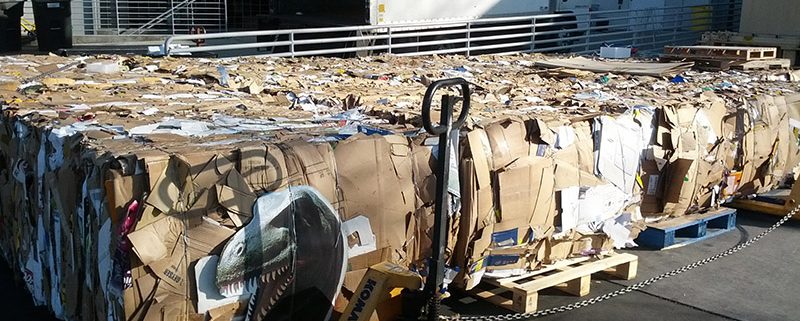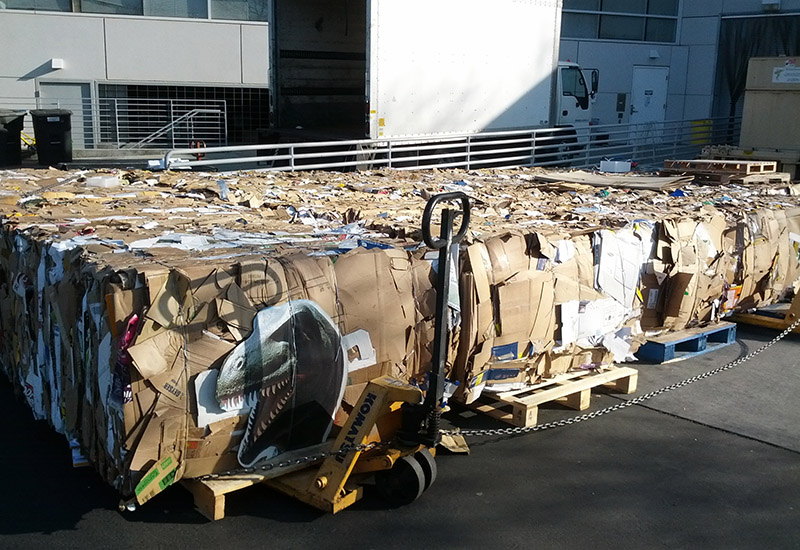Cary Paying More for Recycling Due to Global Demand
Cary, NC – The Town of Cary used to get a rebate for recyclables but a change in import policy from China means the town now pays more than twice as much as it used to recieve for recycling.
Cost of Recycling
Until recently, the Town of Cary sold its recyclables to Sonoco Recycling,a local materials recovered facility (MRF) which has plants in Raleigh and Durham. The Town of Cary was reimbursed for those recyclables about $10 per ton. Sonoco also operates a paper mill while selling recycled materials on the open market, including to China.
In 2017, China started a new policy on recyclables called “National Sword” and in 2018, that policy further changed the rules on the imports of waste paper, requiring a stricter quality without contaminations from other recyclables or garbage mixed in when the waste paper is collected and recycled. This waste paper can be mixed paper, cardboard, corrugated fiberboard and more.
This level of waste paper quality is very difficult for MRFs to currently achieve and resulting in existing waste paper not being sold to China.
“It’s still the same materials and processes,” said Bob Holden, Cary’s solid waste manager. “What’s changed is the value of recyclables.”
Because MRFs are not selling waste paper to China, they are not buying those same products from municipalities. Whereas the Town of Cary previously sold its recyclables for $10 per ton, it now costs the Town of Cary about $21 per ton to send those recyclables for processing.
Holden said one way for Cary to cut down on that cost is by having people recycle properly.
“A big problem is bags. People try to recycle plastic bags or put their recycling in bags,” Holden said. “It causes more problems and affects our dollar figure.” (Plastic bags can be recycled at bins at most grocery stores in the area)
Holden also said this is related to another problem of “wishful recycling,” which he categorized as people recycling items with the recycling triangle on them and believing that an MRF will be able to take care of it.
“They see things and think, ‘They’ll know what to do with this,’ but often it’s not something they’re equipped to recycle and it’s not acceptable,” Holden said.
Changes In The Future
The price of recyclables has fluctuated fairly regularly, although the past five years have seen more demand, so this is not an entirely new scenario. In response to these latest changes and demand for higher quality waste paper, Sonoco Recycling is looking into optical scanners to automate the sorting process and get rid of waste that would contaminate the final paper product.
In Cary, Holden said it is unlikely they will find another MRF to sell to because they are all under similar restrictions. Holden also said the town still encourages people to recycle.
“It’s still the environmentally conscious thing to do and reduces our carbon footprint,” he said.
In the short term, Holden also said recycling diverts reusable materials from the Wake County landfill.
“The chance of finding another location for a landfill in Wake County is remote at best,” he said.
According to a recent blog post from Cary Councilmember Don Frantz, Cary delivers around 11,000 tons of recyclables to Sonoco each year.
Story by Michael Papich. Photos by Travis Wise and Mike Jaquish.






As we consider the complicated business of recycling and the realities of landfills filling up, it’s time to focus on the first element of “reduce, reuse, recycle”. Reducing waste overall needs to become a priority.
Hear, hear!
I’d like to know at what point does paper and other recycle material get mixed. I recycle everything I can. I separate my paper waste, junk mail and magazines in a separate brown paper bag weekly and use my green recycle basket for plastic, cleaned glass and cardboard. I also shred personal records etc and put the shredded material in a separate brown paper bag. I’ve witnessed the recycle crew throw my plastic, paper and shred material all in the truck together, thus mixing all I took time to
separate properly.
Lynn, are you in the town of Cary city limits? If so, you don’t need to sort anything as you’ve described. Also, shredded paper should be placed in a clear plastic bag. http://www.townofcary.org/home/showdocument?id=16140
Appreciate the informative article. It will make me more mindful of the recycling that I do. As other readers have asked, it would be interesting to know the cost of dumping trash into the landfill, but it’s clear that is a limited resource, and finding more landfill space is not ideal.
Questions: 1) So, if China isn’t buying the contaminated waste than who is? 2) What percent of each ton we recycle is ending up going from the recycler (or end user) to landfills anyway? 3) For comparison, what is cost to Cary for each ton of trash going to the landfill?
1) It’s not “contaminated waste”; it’s recycled paper that has not been exclusively kept out of the full recycling stream. If Cary did separate paper and metals/plastics collections, we’d be able to do this.
See above for the landfill/recycling cost, it came up on the earlier story when this issue first was written about in the weekly story about council business.
China was under pressure to rescind their refusal to continue to accept US recyclables…until the inexplicable decision to start a trade war.
Is cost of paying for recycling less than just dumping into a landfill?
Don answered this when this first came up in the weekly thread. $21/ton to send recycling to our MDF is about $3 more per ton than landfilling it ($18/ton).
As I pointed out, though, that $3 gap doesn’t include the process cost of nearly doubling Cary’s rate of landfill; The last numbers that I saw said Cary recycled nearly half of its waste stream. It’s probably worth it to slow our roll toward filling the landfill and continue recycling, even at a $3 “loss”, unless someone has a few thousand acres they’re willing to offer up for the next landfill.